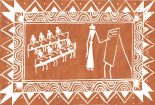This project deals with the sociolinguistic and ethnolinguistic research of several Koraput Munda languages: Sora (Savara), Bonda (Remo) and Gutob (Gadaba).
The goal of the project is to develop a multimedia Internet resource providing access to texts of various genres and spheres of usage in the Koraput Munda languages. The texts are presented in audio, video and printed forms with translation into Russian and English, grammatical glosses, sociolinguistic data and information about specific genres.
The project tasks are both scientific and educational. On the one hand, the site is addressed to linguists, ethnographers, anthropologists, folklorists and other humanities scholars. On the other hand, we hope that the site will be interesting to the native speakers of the Koraput Munda languages, as well as useful for teaching, language planning and preserving the cultural heritage in the regions where the languages are spoken.
Our team has been working on the Koraput Munda languages since 2016. The study of these languages includes a lot of linguistic field work, since the languages have been sparsely studied. The first expedition was organized in Bhubaneswar during the Tribal Fair (Adivasi Mela, February 2016) and resulted in the first acquaintance with the Sora language. In 2017, our work focused on the major idioms of the Koraput Munda: Sora and Juray. A linguistic expedition was made to the districts of Gajapati and Rayagada (Odisha, India). The work was carried out among the tribes of Sora and Juray in the town of Paralakhemundi, in Ranipeta, Serango, Barangsing, Samagayta, Gumma, Porida (Marynagar), Vallada (Christnagar) villages of Gajapati district and in Bagasala, Dombosara, Marichaguda, Engerba villages of Rayagada district. The 2018 expedition provided our project with the data of Gutob and Bonda languages collected in the Koraput district, Hanumal, Onukudelli, Soilpada, Gutalpada villages of the Lamtaput Block. The work results are presented on the site, the data are being constantly updated and elaborated.
The project is supported by the Russian Foundation for Basic Research (17-34-00018 “Sociolinguistic research of the Koraput Munda languages and development of a multimedia corpus of texts exemplifying different social conditions of language usage”).

